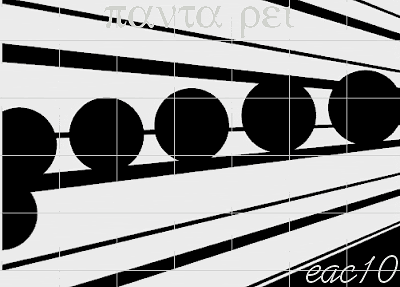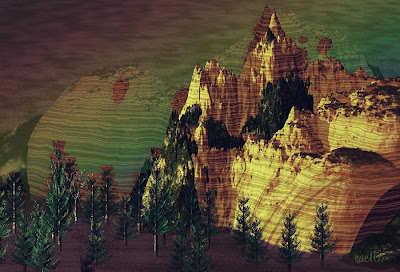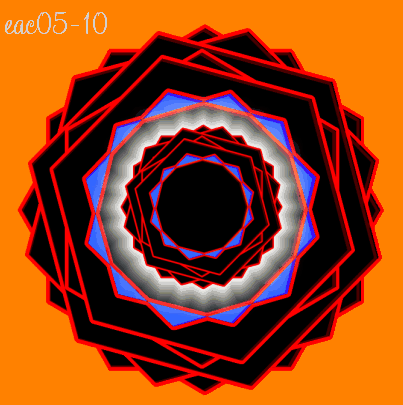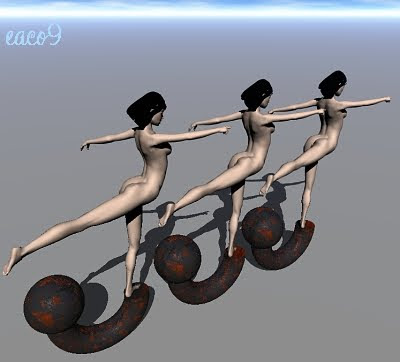
What is it about rivers that gives rise to thoughts about time? Or is this purely a cultural artifact?
Rusticus expectat, go the lines of Horace alluded to by Immanuel Kant in his Prolegomena, dum defluat amnis, at ille labitur et labetur in omne volubilis aevum.
A light and loose rendering might be:
The rube waits for the river to flow away
But it keeps on rolling and rolling
Forever and a day.
But this misses the subtilty of in omne volubilis aevum—“flowing for all eternity”.
The aevum is by the way the origin of the English “eon” and kin to the Greek aion. All three denote both eternity and “life time or “age”.
In turn they are cognate with the Sanskrit ayu, “life”, as well as the Old Norse ævi "lifetime" and the German ewig "everlasting."
In Old English another cognate is “a”, “always, forever”.
In English “time” as a river is still a commonplace, but the figure of flowing in eternity and eternity in turn as ever flowing is not so patent nowadays perhaps as it once was.
One once taught English to a Chinese physicist who, trying to illustrate how “primitive” was his China even in the Twentieth Century, exclaimed, “Why my father believed that the earth stood still and the sun and stars moved around it!”
Somehow the concept of an earth revolving around the sun and turning on its axis in relation to a background of seemingly fixed stars makes the image of a moving, almost living eternity, rather more striking.
Horace’s eternity also gibes neatly with Heraclitus of Ephesus, whose panta rhei—“everything flows” characterizes a universe in flux.
G.W.F. Hegel, whose philosophy hinges on the coincidence of opposites, not surprisingly had a very high opinion of Heraclitus, or at least a very high opinion of whom he thought Heraclitus to be.
“Dieser kühne Geist hat zuerst das tief Wort gesagt, ‘Das Seyn is nicht mehr als das Nichtseyn”, Hegel observed—“This bold spirit first made the profound statement, ‘Being is no more than Non-Being'”, a principle which is central to Hegel’s own philosophy.
It is not clear that Heraclitus ever said what Hegel says he said. There is a passage in Aristotle that seems to convict Heraclitus of holding “all things are and are not”(panta einai kai me einai). But even if this is genuinely Heraclitan in origin rather than a later extrapolation, the coexistence of is and is not is not quite the same thing as their being identical.
The closest an inarguably genuine fragment comes to postulating an identity of what is and what is not is: potamoisi toisi autoisi embainomen te kai ouk embainomen, eimen te ai ouk eimen—that is, “In the same rivers we both step and do not step, we both are and are not.”
The difficulty with taking this in wholly existential terms is that “are” and “are not” may refer only to being and not being in the same rivers in question rather than to a general being and not being at the same time.
From another perspective it is not until Parmenides, Heraclitus’ great critic, that a logical analysis of absolute being and non-being is accomplished. Heraclitus, then, seems rather wrapped up in opposites and their putative unity, which is indeed the whole thrust of the philosophy evidenced in the surviving fragments. He does not, for instance, ever seem to have separated these opposites into strictly logical events susceptible to authentic ontological analysis.
Among the most legended of Heraclitus’ fragments is, “You cannot step into the same river twice” (dis es ton auton potamon ouk an embaies) which survives in a quotation by Plato.
This makes immediate if perhaps all too superficial sense to many moderns seemingly because, as Heraclitus himself elaborates in other fragments, upon those who do step into a stream “ever different waters flow”, which is to say, that the river perforce of its movement is always in motion and thus no definite and completed thing.
A common apprehension in the ancient world is, then, that Heraclitus was undermining the unconscious identification of names with things both unchanging and existent simply because named.
This may not be wholly mistaken.
Plato’s dialogue between Socrates and the avowed Heraclitan, Cratylus, is a rollicking carnival of word play with a philosopher who, according to Aristotle, went his master Heraclitus one better with the argument that, if you cannot step in the same river twice, you cannot not step in it even once—oud’ hapax.
Also according to Aristotle, this Cratylus ended up by holding that he need not say anything at all but simply point his finger.
Plato tells us, specifically in the context of the river image, that Heraclitus’ context was that of a judgment to the effect that “everything goes forward and nothing stands still” (panta chorei kai ouden menei).
Whether or not Heraclitus put any emphasis on the point, the use of “go forward” (choreo) specifically conjoined with a river is in effect an implicit statement that the “flow” of time is unidirectional.
Plato also informs that Heraclitus’ river was a metaphor for all existence (ta onta).
Aristotle, pursuing the same metaphor, concluded that this view implied real motion in all things, even those that seemed to stay the same.
This is apparently going too far for many moderns. G. S. Kirk and J. E. Raven ask, “Can Heraclitus really have thought a rock or a bronze cauldron, for example, was invariably undergoing invisible changes of material. Perhaps so; but nothing in the extent fragments suggests that he did, and his clearly expressed reliance on the senses suggests that he did not. It cannot be too strongly emphasized that before Parmenides…gross departures from common sense must only be accepted when the evidence for them is very strong.”
Ironically, the notable departure from common sense here seems to be that of Messrs. Kirk and Raven in thinking that an ancient Greek who relied on his senses would necessarily see a rock or a bronze cauldron as some determined and materially unchanging object. Bronze corrodes, as every Greek certainly knew, and over time even rock like marble undergoes subtle but clearly observable changes to those with a close eye and long attention span, both of which Heraclitus, along with most other Greeks of the time, surely had.
Kirk and Raven are fine and useful scholars. It is all the more significant, then, that they are the ones who seem to populate the world, even the ancient world, with sensuously unchanging “objects” undergoing “invisible changes”, which is, of course, exactly what the modern physicists and chemists and such would have the laity believe, to wit, both (1) that they qua “scientists” are initiates of a molecular and sub-atomic “invisible world” through their science, and (2) that this world is not obvious as a matter of sense and common sense to the rest of unscientific humanity.
Too, it seems, Kirk and Raven have taken the metaphor of the flowing river quite to heart and also in the context of modern physics. If common objects “flow” must they not flow as a river with ever different but unseen “matter” in motion through a seemingly unchanging form?
It may be that the most obvious conclusion to be reached from what Plato says is that Heraclitus was less interested in the materies of such things as rocks and pots than in all those kinds of changes that are only too visible over time—as the flow of rivers—but which are concretized in language as unchanging and definite “things” purely as a matter of names.
Admittedly this is a red herring, for there is every reason to conclude that Heraclitus was no materialist at all, and surely not in the grossest and most rudimentary of modern modes.
“The way up and down is one and the same way" (hodos ano kato mia kai houte)—another of Heraclitus' more famous fragments—seems on the surface the exact opposite of a material opposition, and as a matter of direction, is in kind a purely formal polarity.
What is this “one way”, then, and how can that “one way” be reconciled with the implied “going forward” of a river?
Descending again to the level of rocks and bronze cauldrons, that may be easily explicable if is recalled that the “same” river’s course may meander in many directions of the compass. The direction of the flow, on the other hand, is unidirectional along a continuous line away from each past locus and toward the next and future one, which is never the last.
Interestingly enough, the flow of a river as metaphor of reality in eternal flux through time corresponds almost eerily to the Buddhists’ view that the world is a multiplicity of objects imaged as “strings of events in one direction, "strings” in which every moment is seen as the cause of the one following (samantara-pratyaya).
Is it mere coincidence that Heraclitus and Gautama Buddha happen to be rough contemporaries?
To the “same” river in which we are and are not, the much later Roman Stoic philosopher (also tutor and advisor of the young Emperor Nero) Lucius Annaeus Seneca adds an intriguing dimension in one of his letters: et ego ipse, dum loquor mutari ista, mutatus sum. Hoc est quod ait Heraclitus: in idem flumen bis descendimus et non descendimus—manet enim idem fluminis nomen, aqua transmissa est. Hoc in amne manifestius est quam in homine, sed nos quoque non minus velox cursus praetervehit, to wit:
“And I myself in the process of saying that these things change, change. This what Heraclitus says—in the same river we step twice and do not step at all, for while the name of the river is the same, the water has rolled on. This is clearer in the case of a river than it is in that of a human being, but nevertheless the swift stream carries us ever onward.”
It has not been noticed, as far as one knows, how reminiscent Seneca’s figure of the swift stream—velox cursus—is of Horace’s fluent eon, “voluble for all time.” Is it then the most arbitrary of ideas to refer both to the Heraclitan image of all things in flux—panta rhei—as a river, including Heraclitus himself, who makes the observation?
“And I myself in the process of saying these things change, change.” So far as it goes, that is simple logic. If all things change and Seneca is a thing, Seneca changes. Note, however, that according to Seneca the name of the river—nomen fluminis—stays the same. At one end, that takes us immediately back to Plato’s Cratylus, and at the other to Friedrich Hegel and Ludwig Wittgenstein.
But those are tales for another day.
[copyright E.A. Costa 1984/2010]






